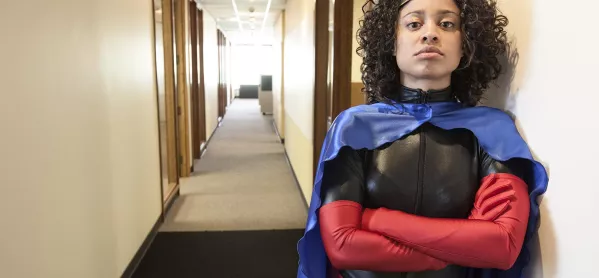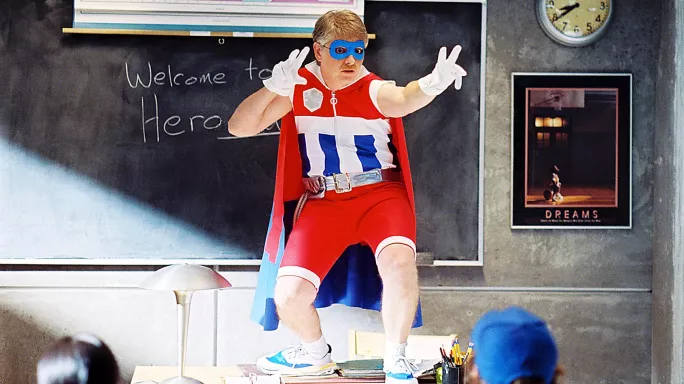- Home
- Teachers can’t fix society - but we still want to
Teachers can’t fix society - but we still want to

“People sure have inflated ideas of what I’m capable of. One part of society thinks I can stop the pupils doing knife crime, another lot thinks I can turn them gay. I haven’t the heart to tell them that I’ve been trying daily since September and they still can’t skip count in sevens.”
I tweeted the above a couple of weeks ago. Nearly 2,000 likes later, it seems I touched a nerve.
Quick read: ‘Teaching means responsibility but little status’
Quick listen: How to teach a child a lesson for life
Want to know more? Education’s funding crisis: what if the money runs out?
It’s easy to see why teachers feel overwhelmed. At times it can hard to make out the core purpose of our job.
One day, we’re told that we need to deal with obesity. The next, it’s road safety.
Something needs to be done about the nation’s table manners? Teachers can deal with that.
But in the pupil progress meeting, all those extras fall away and it’s back to reading, writing, arithmetic and results.
The good old days?
It’s tempting to infer that we would like to retreat to the time - almost certainly fictional - when teachers were held responsible solely for the academic progress of their pupils.
A time when our remit began and ended with the national curriculum or the specifics of the exam board.
Imagine how we could press on with the learning if the steady drip of extra responsibilities were to stop eroding our time!
But do I really want to teach in a system where responsibility beyond that is seen as a distraction from the job at hand?
Past pupils
I imagine that most teachers who have been working more than a few years have, like me, some past pupils who often come to mind unbidden, bringing a heavy heart and a sense that - whatever their Sats results - we didn’t do the best for them.
I think of a child who was groomed and abused, and wonder whether better sex and relationships education might have given her a better chance of avoiding that awful experience.
I think of a pupil who returned from a family trip to an African country with urinary incontinence and severe ongoing infections that caused wetting, discomfort and shame. What if I’d known about female genital mutilation (FGM) then? Could I have intervened and insisted she got the help she so clearly needed?
I think of the gentle, sensitive boy who was tormented for being “gay” and who has indeed turned out to be a gay adult. With greater confidence and stated support from the government, could I have found a way to give him a better time at school?
Most of all I think of a boy who is now serving time in prison for an attack in which another young man - a victim of mistaken identity, the court was told - was set upon in a park so severely that he is lucky to be alive and has a metal plate in his skull that he will carry for the rest of his life.
What did I do as a teacher, what did we do as a school, what did the community and the boy’s family do, that set him on that road? What did we neglect to do?

I was not sufficiently informed about FGM to help. I did not have a robust understanding of child sexual exploitation or the resources to address the subject with at-risk pupils.
I did not have the confidence of my school’s backing to properly address homophobia. I didn’t know how to identify or support children at risk of recruitment to gangs and violence.
Random responsibilities
I don’t think that any teacher genuinely rejects the simple fact that we can, and do, impact on the wider lives of the young people in our care. I don’t believe that colleagues spurn that responsibility or would choose to do so if it were possible.
I do think that they are sick and tired of a scattergun of novel and seemingly random responsibilities coming their way unpredictably and unsustainably. The issue isn’t caring, it’s being able to do something about it.
If we really want the best for our young people, we need prioritised, resourced programmes. We need to know that we will be trained and supported to deliver these effectively and that they will be given due weight alongside the many other professional duties we agree to.
And we’d like to do it in a system that is supported by adequately funded services such as children’s centres, child and adolescent mental health services (CAMHS) and advisers.
So, yes, society may have an inflated idea of what I am capable of but my problem is not that I choose to reject those expectations but that I’d really, really like the support to make sure I can fulfill them to my own high standards.
Ed Finch is a primary teacher in Oxford and founder of #BrewEd. He tweets @mrefinch
Keep reading for just £1 per month
You've reached your limit of free articles this month. Subscribe for £1 per month for three months and get:
- Unlimited access to all Tes magazine content
- Exclusive subscriber-only stories
- Award-winning email newsletters


